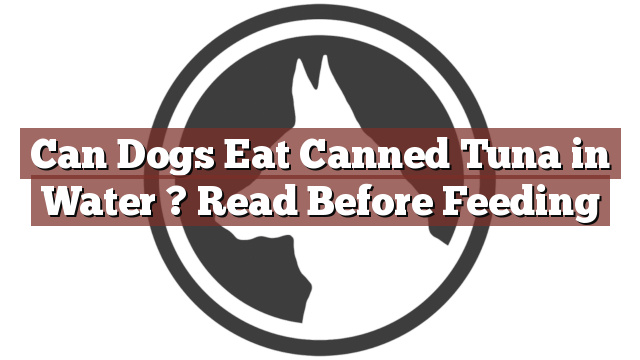Understanding Your Dog’s Dietary Needs
As a responsible pet owner, it is vital to understand the dietary needs of your beloved canine companion. While dogs primarily thrive on a diet of meat, it is essential to provide a balanced and nutritious meal that covers all their nutritional requirements. This includes proteins, fats, carbohydrates, vitamins, and minerals. Before introducing any new food into your dog’s diet, it is crucial to research and consult with a veterinarian to ensure it is safe and suitable for your furry friend.
Can Dogs Eat Canned Tuna in Water? Read Before Feeding
Can dogs eat canned tuna in water? This is a common question among dog owners who are looking to diversify their pet’s diet or provide an occasional treat. The answer is yes, dogs can eat canned tuna in water, but there are a few things to consider before feeding it to your furry friend.
Pros and Cons of Feeding Canned Tuna in Water to Dogs
Feeding your dog canned tuna in water has both pros and cons. On the positive side, tuna is a great source of lean protein, which is essential for dogs. It provides important amino acids that promote muscle development and overall growth. Additionally, tuna is rich in omega-3 fatty acids, which are beneficial for the dog’s skin and coat health. These fatty acids also contribute to joint health and support the immune system.
However, there are a few drawbacks to consider. Firstly, canned tuna often contains a high level of sodium, which can be harmful to dogs, especially those with certain health conditions like heart disease or kidney problems. Secondly, canned tuna may also contain mercury, which is toxic to dogs in large quantities. It is essential to feed canned tuna as an occasional treat in moderation, rather than as a regular part of their diet. It is also recommended to choose canned tuna in water rather than oil, as oil can add unnecessary calories and fats to your dog’s diet.
In Conclusion: Considerations for Feeding Canned Tuna to Dogs
While dogs can eat canned tuna in water, it is important to carefully consider the potential risks and benefits before adding it to their diet. Consult with your veterinarian to ensure it is appropriate for your dog’s specific needs and health conditions. If you decide to feed canned tuna to your dog, do so in moderation and ensure it is a supplement to a well-balanced diet. Remember to choose tuna packed in water and avoid any seasonings or additives that may be harmful to your furry friend. Your dog’s health and well-being should always be the top priority.
Thank you for taking the time to read through our exploration of [page_title]. As every dog lover knows, our furry friends have unique dietary needs and responses, often varying from one canine to another. This is why it's paramount to approach any changes in their diet with caution and knowledge.
Before introducing any new treats or making alterations to your dog's diet based on our insights, it's crucial to consult with a veterinarian about [page_title]. Their expertise ensures that the choices you make are well-suited to your particular pet's health and well-being.
Even seemingly harmless foods can sometimes lead to allergic reactions or digestive issues, which is why monitoring your dog after introducing any new food item is essential.
The content provided here on [page_title] is crafted with care, thorough research, and a genuine love for dogs. Nevertheless, it serves as a general guideline and should not be considered a substitute for professional veterinary advice.
Always prioritize the expert insights of your veterinarian, and remember that the health and happiness of your furry companion come first.
May your journey with your pet continue to be filled with joy, love, and safe culinary adventures. Happy reading, and even happier snacking for your canine friend!

